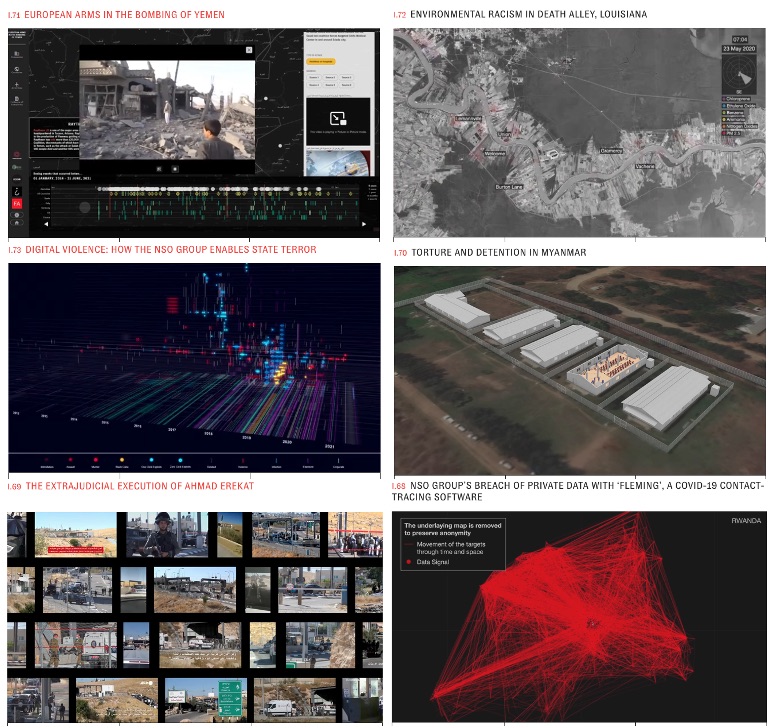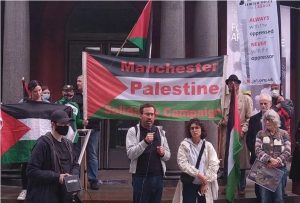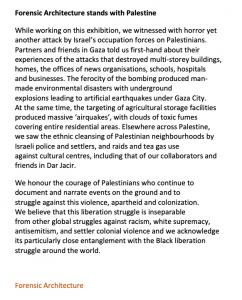Forensic Architecture: a coda

JVL Introduction
We have followed the story of the Manchester Whitworth Gallery spat with UK Lawyers for Israel in a series of recent postings (see further reading below the article).
Greater Manchester Jewish Voice for Labour sent a letter to the University of Manchester, arguing that is decision to concede anything to these vexatious complaints has demonstrated a moral weakness and intellectual confusion unworthy of a great university – see below.
And now that the attempt at censorship has been decisively defeated, Forensic Architecture has taken this opportunity to explain its work in the pages of Guardian:
“Forensic Architecture is not exactly an art collective, as some people refer to us. Rather, we are a university research group that works with communities at the forefront of conflict all over the world. We develop architectural tools and techniques to gather evidence of human rights violations for use in national and international courtrooms, parliamentary inquiries, citizen tribunals, community forums, academic institutions and the media. We also present our findings in galleries and museums when other sites of accountability are inaccessible.”

Diector of Forensic Architecture, Eyal Weizman, speaking at a demonstration outside the Whitworth Gallery. Manchester PSC and JVL banners in the background. Photo: LabourHub
Greater Manchester Jewish Voice for Labour writes:
Dear Nancy Rothwell, Nalin Thakkar and Alistair Hudson,
We are writing to you as official representatives of Greater Manchester Jewish Voice for Labour to condemn the appalling decision by the Whitworth Art Gallery and Manchester University to accede to the unjustified demands of UK Lawyers for Israel and other pro-Israel lobby groups to remove a crucial element of the Forensic Architecture exhibition. The pretext for this demand was the false and vexatious accusation that the University “appears to have failed to comply with its Public Sector Equality Duty by not considering the impact of the inflammatory language and representations contained in the exhibition on Jewish people in Manchester”. This accusation could only be justified by a deliberate conflation of Jewish ethnicity with approval or responsibility for the actions of the Israeli state. Such a conflation is however itself universally recognised as a form of antisemitism. We note that the exhibition itself in no way suggests such a conflation, and any suggestion that Professor Eyal Weizman, the director of Forensic Architecture and a highly respected academic who is himself Israeli by birth, would make such a conflation is ludicrous. It is rather the implied conflation by UKLFI itself which renders the accusation particularly vexatious.
We are alarmed to learn that although the gallery has now reinstated the Director’s statement, it is intending to add a “space” to contextualise the issues raised in the exhibition. We condemn this decision. The crimes against humanity of settler colonialism against an entire indigenous people can never be euphemistically “contextualised” by reference to the inevitable resistance of the victims, nor can they be diminished by diversionary comparisons with other crimes against humanity in other times and places.
We note that by acceding to the unjustified demands of UKLFI and other committed pro-Israel groups, the University has demonstrated precisely the institutional prejudice it claimed to be seeking to avoid. It did not consult any other community groups which may justifiably have felt aggrieved and threatened by such a blatant act of political censorship, which in effect sought to diminish a protest against the persecution of the Palestinian people. In particular it did not consult the Palestinian, Arab, or Muslim communities in Manchester; but neither did it consult any of the many different representative organisations of Jews who abhor the settler colonialism of the Israeli state. Moreover many such Jews regard with fear and horror the attempts by pro-Israel groups to assimilate them by default to Israel’s settler colonial project, considering Israel to be the greatest accelerator of antisemitism in the world today, to quote the words of a noted columnist, B.Michael of Israel’s leading newspaper Ha’aretz.
The response of the University to these vexatious complaints has demonstrated a moral weakness and intellectual confusion which is unworthy of a great university.
Unfortunately this is not the first occasion on which the University has demonstrated such confusion in its response to the totalitarian demands of pro-Israel lobbyists.
In 2017 the university compelled a holocaust survivor Marika Sherwood, to change the title of her talk because it compared Israel’s treatment of Palestinians to what she had suffered as a child. The change, together with other severe restrictions on free speech, came after pressure exerted by the then Israeli ambassador Mark Regev. The pressure from the Israeli embassy only came to light after the Information Commissioner compelled the university to respond to a freedom of information request. This incident was even cited by Kenneth Stern, lead author of the IHRA definition of antisemitism in written evidence to the US Congress, as an example of the egregious effects which the misuse of the IHRA definition had had on academic freedom on campuses in the US and UK.
Remarkably however in 2017 the University refused to yield to a campaign by Jewish and Christian religious leaders to remove books by the notorious antisemitic historian David Irving from open display in the John Rylands University library. On that occasion the University issued the following robust defence of freedom of expression:
“The university is committed to allowing our students to have access to challenging and controversial works on many different subjects in order to pursue their studies. This approach in no way compromises the university’s fundamental rejection of discrimination which is at the heart of how we seek to educate students and pursue our research activities.”
Despite the toxic beliefs of Irving, we believe, in line with principles championed from J.S.Mill to Noam Chomsky, that that decision by the University was correct.
However we now feel obliged to ask: on what grounds did the University feel justified in respecting the freedom of expression of the antisemitic nazi apologist David Irving, while restricting the freedom of expression of Jewish antiracists Marika Sherwood and Eyal Weizman?
Best Regards,
Erica Burman
Alison Harris
Robert Lizar
George Wilmers
Deborah Windley
Executive Officers, Greater Manchester Jewish Voice for Labour
Our art deals with real injustices, some in Palestine: no wonder we faced opposition
Forensic Architecture, the Guardian, 20 August 2021
On Wednesday, protesters in Manchester reclaimed one of the city’s main cultural institutions. Despite the rain, pro-Palestine activists gathered in front of the closed doors of the Whitworth gallery, part of the University of Manchester. It was because of their persistent action, and 13,000 letters sent to the gallery, that part of our exhibition, a printed statement titled “Forensic Architecture stands with Palestine”, has been reinstated. The exhibition, which we insisted be shut as a result of the statement’s unilateral removal, has now reopened.
On Sunday 15 August, a blog post on the website of UK Lawyers for Israel (UKLFI) announced that, following the group’s intervention, the statement had been removed from our exhibition, Cloud Studies. When we first heard of the news, we were not altogether surprised. The same group had already criticised a statement of solidarity with Palestinians published on the Whitworth’s website in June, and succeeded in convincing the university to have it removed. And this was hardly UKLFI’s first attack on us as an organisation. In 2018, when we were nominated for the Turner prize, UKLFI urged the Tate not to award the prize to us on the outrageous grounds that documents that we had published in relation to Palestine amounted to “modern blood libels likely to promote antisemitism and attacks on Jews”.
Forensic Architecture is not exactly an art collective, as some people refer to us. Rather, we are a university research group that works with communities at the forefront of conflict all over the world. We develop architectural tools and techniques to gather evidence of human rights violations for use in national and international courtrooms, parliamentary inquiries, citizen tribunals, community forums, academic institutions and the media. We also present our findings in galleries and museums when other sites of accountability are inaccessible.
Thus, though surprised by the Turner prize nomination, we chose to use the platform to unravel official Israeli statements about the 18 January 2017 killing of Bedouin Palestinian Yaakub Abu al-Qi’an by Israeli police officers. We collaborated with residents of the Palestinian village of Umm al-Hiran and activists to produce an investigation, which collectively challenged the claims of Israeli officials that al-Qi’an was a “terrorist” and instead revealed a cruel act of killing and a crude cover-up. The investigation’s conclusions were hard to contest – even Israel’s hard-right then prime minister Benjamin Netanyahu was eventually forced to apologise for the killing.
Our work is indicative of the advent of a new kind of political art: one that is less interested in commenting on than intervening in political realities. It is in this spirit that we exhibited Cloud Studies at the Whitworth. The title refers to the advent of meteorology in the 19th century in the combined work of scientists and artists, but rather than looking at the weather, the exhibition maps today’s toxic clouds: from teargas in the US, Palestine, and Chile, through to chemical strikes in Syria, to those produced by extractive industries in Argentina, to the CO2 clouds created by forest fires in Indonesia.
A key part of the exhibition is our study of environmental racism in Louisiana – specifically, a heavily industrialised “petrochemical corridor” along the Mississippi river between Baton Rouge and New Orleans. Residents of the majority-Black communities that border those facilities breathe some of the most toxic air in the country, and suffer some of the highest rates of cancer.
In May, as we worked on the exhibition, the latest round of Israeli attacks on Gaza began. We followed closely as collaborators, friends and former staff in Gaza and elsewhere in Palestine sent us horrific images in real time of the destruction Israeli forces were wreaking on their homes and businesses. When we witnessed clouds of toxic fumes rising over the bombed-out chemical facilities in Beit Lahia, it felt like a live rendition of our Cloud Studies.
Attacks extended also to art institutions: our close friend the Palestinian artist Emily Jacir sent us videos of Israeli forces raiding Dar Jacir, a vital independent artist-run space in Bethlehem.
Our statement, whose inclusion in the exhibition had been approved during its planning stages by the Whitworth’s curators, was written as these attacks were happening. We used terms such as “ethnic cleansing” and “apartheid” to describe the policies of the Israeli government in Palestine, because such characterisations describe the reality of Palestinian life and are in keeping with the language of major Israeli and international human rights organisations, and have of course been used by Palestinians for decades. The term “settler colonialism”, similarly, has been used extensively by scholars to describe Israeli policies in Palestine. If such terms are offensive, they are most offensive to those experiencing the everyday impact of such policies. Universities need to be places where such categories can be presented, developed and debated, and our battle to reinstate the statement was really about what could be said within an academic and cultural environment.
Pandering to groups such as UKLFI – an organisation that hosted a public event featuring the far-right Israeli settler organisation Regavim, which supports the demolition of Palestinian homes – is not only a violation of the principle of the freedom of expression, but also shows a lack of moral integrity. Our case is only one and not a particularly major example, of the smear campaign and legal attacks on Palestinian artists and intellectuals, many of whom face repression at the hands of Israeli occupation authorities, and censorship and restrictions on their freedom of expression internationally. For us, the campaign by UKLFI to discredit Forensic Architecture is part of such efforts to silence and intimidate. The fact that a concerted effort managed to reverse Manchester University’s position, shows that such action can and must be collectively resisted.
This battle at the Whitworth also has something to say to those in charge of cultural policy: as galleries increasingly look to host political art, institutions and publics alike should not be surprised when political art is, well, political.
- Forensic Architecture is a research agency that investigates human rights violations including violence committed by states, police forces, militaries, and corporations.


What an inspiring statement!
Great letter from Greater Manchester JVL to the University of Manchester and a terrific statement from Forensic Architecture. UKLFI is a shameful organisation of anti Palestinian bigotry. It seeks to rewrite Palestinian history to exonerate the state of Israel. It even has the cheek to accuse those of us who describe Israel a settler colonial enterprise of antisemitism. How such a partisan organisation has managed to maintain its charitable status is beyond me. I would be interested to know whether or not any of the local Labour politicians and CLPs involved themselves in defending the exhibition.
Bravo! I shall flag this up for discussion on my account at University of Essex
Prof (Emeritus) Law /Human Rights
Ellie Palmer
An important win against the totalitarian approach of too many unthinking opponents. Great statements. Well done.
Regards
Very powerful.
A significant victory.
Thank goodness that normality has mostly returned to Manchester University and the Whitworth Gallery. The Israeli illegal settler lobby overreached itself. Thank you, JVL and others,for standing up to the pervasive hypocrisy. This episode may be another tipping point of the false antisemitism claims scam.
There is a whole Zionist ‘industry’ designed and determined to skew any criticism or fact with respect to Israel and its treatment of Palestinians into an antiSemitic attack on Jews. Those who are aware of the tactics of the pro-Zionists must be constantly on the lookout for this type of subterfuge and be just as determined to call it out and go into combat against it.
Well done to ‘Greater Manchester Jewish Voice for Labour’
First good news story in many a long month …
Here we see an own-goal scored by UKLFI.
All the sweeter to see their bullying arguments so-decisively defeated by the counter-arguments of PSC and JVL and around 13,000 letters / emails sent to the Whitworth gallery by supporters of Palestinian rights.
The bit of the statement I find most offensive is settler colonialisation. It implies that the chief motive of Zionism was to, in creating Israel, to exploit the existing inhabitants, rather than to have a homeland safe from millenia-long persecutions culminating in the Holocaust. In addition it identified Jews as a white people rather than a people of different colours, all of whom have been in the past regarded as racial minorities by white (other) Europeans. Of course from the Palestinian perspective these arguments matter little, their experience is of displacement with no heed taken of their voice. But the problems of Israel/Palestine will only be solved by those able to understand both perspectives, albeit one side does hold most of the power.
On balance I think the University of Manchester should not have removed the statement, but suggested a contextualisation or a different view to be put up alongside it. I think you are wrong to critisise such a contextualisation. It is no different to insisting that a controversial speaker be platformed with those holding a different view. Forensic Architecture is clearly using art for political purposes. This is fine, but means the exhibition cannot be treated purely as art but as the political statement it is.
… an example of the egregious effects which the misuse of the IHRA definition had …
Any use of the IHRA definition has to be misuse, because the IHRA “definition”, when examined, is useless as a definition:
https://www.jewishvoiceforlabour.org.uk/article/thats-not-a-definition-once-more-on-the-ihra/
There are several points made in Hazel Seidel’s comment that deserve a response:
1) The definition of settler colonialism is a form of colonialism that seeks to replace the original population of the colonized territory with a new society of settlers – Wikipedia. This is an accurate description of what happened and continues to happen in Palestine. It may be uncomfortable for some to hear such a fact, but that is no reason for it to be censored or suppressed.
2) The history of persecution against Jewish people is indeed horrendous. However, this should not be used as a justification for the ethnic cleansing and oppression of the Palestinian people. The quote by Marek Edelman on the home page of this website makes the point eloquently.
3) I can find no mention in any of the statements about all Jewish people being white, which of course would not be correct. The point that is clearly made, and quite correctly so, is that Israeli policies towards Palestinians constitute apartheid.
4) Concerning “contextualisation”, I agree totally with the Greater Manchester JVL statement. As Forensic Architecture point out, their work is political art. If Manchester University, or anybody else for that matter, wants to organise a debate about the issues raised in this exhibition, they should be free to do so, but they should not interfere with content of this exhibition, or introduce “contextualisation”, against the wishes of Forensic Architecture.